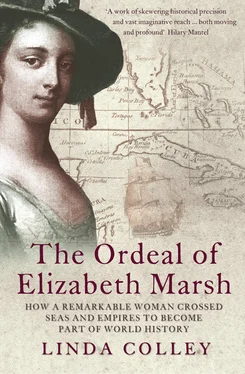Elizabeth Marsh’s life is at once startlingly atypical and widely revealing, strange and representative. She was conceived in Jamaica, and may have been of mixed racial parentage. Her voyage in utero across the Atlantic from Kingston to England was the first of many oceanic journeys on her part, and inaugurated a life that was shaped as much by water as dry land, and that even on shore was spent in a succession of cosmopolitan ports and riverside cities. As a child, Elizabeth Marsh moved between Portsmouth and Chatham and the lower decks of Royal Navy warships at sail. Migrating with her family to the Mediterranean in 1755, she lived first in Menorca, and then – after a French invasion drove them out – in Gibraltar. Taken to Morocco in 1756 by force, but also as a consequence of her own actions, she was one of the first nominal Europeans to have a sustained personal encounter with its then acting Sultan, Sidi Muhammad, penetrating to the heart of his palace complex at Marrakech, and barely escaping sexual enslavement. The under-educated daughter of a shipwright, she subsequently became the first woman to write and publish on the Maghreb in English.
Elizabeth Marsh spent the late 1750s, and early and mid ’60s, comparatively becalmed in London by marriage and childbirth, but watching her husband engage in trade with Western and Eastern Europe, Northern Africa, mainland North America and the Caribbean, and parts of South America and Asia. She also plotted with him to emigrate to Florida. Instead, bankruptcy drove him to flee to India; and in 1771 Elizabeth Marsh would join him there, sailing to the subcontinent by way of visits to Rio de Janeiro and the Cape, on the only ship then to have circumnavigated the world twice over. She did not stay in their new house at Dhaka for long, however. After dispatching her young son briefly to Persia, and her daughter back to England, Marsh set out by sea for Madras in December 1774.
She would devote much of the next eighteen months to visiting and exploring settlements, towns and temples in eastern and southern India, composing in the process one of the strangest and most emotive accounts of an overland journey in the subcontinent to be written at this time by anyone, male or female. Her closest companion on this Asiatic progress was an unmarried man; and although Elizabeth Marsh rejoined her husband in Dhaka in mid-1776, it was again not for long. From late 1777 to mid-1780 she was once more on the move, sailing first from Calcutta to England, and then, after more than a year’s intrigue, and a further twelve thousand miles at least in sea distance, returning to the subcontinent. She embarked on these last circuitous voyages in defiance of French and Spanish warships and privateers that were now fighting in support of the new-minted United States, and because some of the long-distance repercussions of the American Revolutionary War were undermining her husband’s business and existence in Asia, and threatening her children and herself.
As this suggests, while Elizabeth Marsh can seem an almost impossibly picaresque figure, viewing her thus would miss what was most arresting about her life, and all that lay behind it. To an almost eerie degree, Marsh was repeatedly caught fast in geographically wide-ranging events and pressures. This was true even of what should have been her intimate rites of passage. The circumstances of her birth (like the meeting and marriage of her parents), the nature of her upbringing, the sabotage of her first engagement, the making of her marriage, and the stages of its unravelling, her response to the advent of middle age, and the manner in which her two children were eventually provided for – all of these, and not just her travels and her writings, were influenced by transcontinental developments. For Elizabeth Marsh, there was scarcely ever a secure divide between her personal life on the one hand, and the wider world and its accelerating changes on the other. This was the nature of her ordeal. The degree to which she was exposed to it throughout the half-century of her existence was due in large part to circumstances beyond her control. It was due to the occupations of her male relations, and to the fact that she herself was a dependent woman without paid employment, and therefore vulnerable. It was due to her own, and her extended family’s, connections with Britain and its tentacular, contested empire. And, crucially, it was due to the global circumstances of her times. But the intensity and relentlessness of Elizabeth Marsh’s ordeal were also a product of the sort of person she was and of the choices she made.
Elizabeth Marsh’s father, his father and grandfather, and multiple cousins, were shipbuilders, mariners, and makers of charts and maps. Through these men, she was linked all her life to the Royal Navy, one of the few organizations at this time possessed of something genuinely approaching global reach, and to the sea: ‘the great high road of communication to the different nations of the world’, as Adam Smith styled it. 1 Marsh’s uncle and younger brother were administrators and assemblers of information on behalf of the British state, men employing pen and paper in order to manage distance. Her husband, James Crisp, was a merchant, engaged in both legal and illicit long-distance trade. His dealings encompassed ports and manufacturing centres in the world’s two largest maritime empires, those of Spain and Britain, and some of the commodities most in international demand: salt, sugar, cotton textiles, fish and tea. And he was associated with the British East India Company, the most important transnational trading corporation in existence, as subsequently were Marsh’s son, her son-in-law, yet more ‘cousins’, and ultimately her half-Indian grandson.
Her husband was also involved in colonial land speculation and migration schemes, as was she. Her elder brother and still more ‘cousins’ were army officers, servicing empire and its wars; while the agency that was responsible for driving by far the largest numbers of human beings across oceans and between continents at this time, the transatlantic trade in West African slaves, may have given rise to the woman who became Elizabeth Marsh’s mother. Marsh’s husband certainly was implicated in this slave trade, though it was two other systems of slavery and slave-taking, in Northern Africa and in Asia, in which she herself became directly involved, both as an intended victim and as an owner.
By way of her extended family, then, Elizabeth Marsh was brought into contact with some of the main forces of global change of her time: enhanced maritime reach, transoceanic and transcontinental commerce, a more deliberate mobilization of knowledge and written information in the service of the state, the quickening tempo of imperial aggression and colonization, emigration, war, slavery and the slave trade. Many millions of people were caught up in one or more of these. Elizabeth Marsh was affected and swept into movement by all of them. This owed something to her gender and uncertain status. As a woman who was usually economically dependent, she was often dragged along in the wake of various menfolk. Consequently, their occupations, and their migrations, and their exposure to other societies frequently also entangled her.
In this and other respects, the near contemporary whom Elizabeth Marsh most closely resembles is Olaudah Equiano (c.1745–97), the one-time slave of African descent who, by way of his writings and travels, made himself a ‘citizen of the world’, as well as an African and a Briton. 2 It is telling that both Elizabeth and Olaudah were connected with the Royal Navy, with the slave trade, and with print; and they were alike too in their urge repeatedly to re-invent themselves. Their different, but essentially similar, lives also unfolded across great spaces and in a range of diverse cultural settings because of something else they had in common. Elizabeth Marsh, like Olaudah Equiano, chose to move, and was compelled to move. Avid travellers by instinct, they were each in addition forced into journeying as a result of their subordination to others: Equiano because for part of his life he was a slave, Marsh because she was a woman without independent financial resources.
Читать дальше












